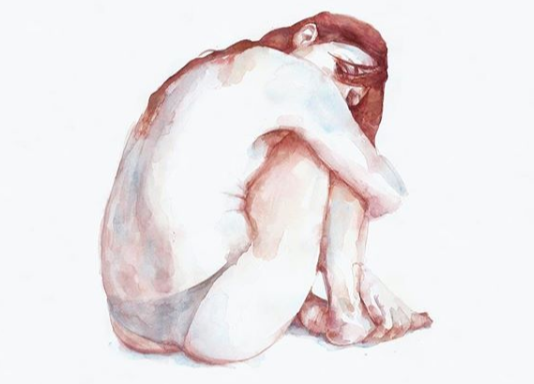
Pain during sex: women need the tools to communicate their needs
“The world is disturbingly comfortable with the fact that women sometimes leave a sexual encounter in tears.” Lili Loofbourow
According to a recent study published in The Journal of Sexual Medicine, about 30 percent of women report feeling pain during vaginal intercourse.
This alarming statistic is only recorded amongst women who are even comfortable speaking to doctors about sex, meaning that a far greater number could be more accurate.
Another hugely concerning fact which the study expressed is that "large proportions" of women don't tell their partners when sex hurts, they simply grin and bear it.
This testifies to the notion that women often sacrifice their pleasure, not to mention their comfort, for male satisfaction. The assumption that “bad sex” simply means the absence of pleasure is a naïve one- for many women, “bad sex” can mean extreme discomfort and even agony.
Debby Herbenick, an academic from the Indiana University School of Public Health and one of those who incentivised the National Survey of Sexual Health and Behaviour, confirmed this suggestion.
"When it comes to 'good sex,'" she commented, "women often mean without pain, men often mean they had orgasms."
The satisfaction scale for men and women is clearly imbalanced. Painful sex isn’t the rare outlier that it’s proclaimed to be, in fact, it’s far more widespread than imagined.
For some women, such as those suffering from illnesses such as endometriosis, ectopic pregnancies and vaginismus, it’s part of their reality.
For others, they are in need of more foreplay, lubrication or comfort. Anxiety and tension can have a drastic impact on female sexual pleasure.
There are dozens of possible reasons why you could be experiencing pain during sex, ranging from the physical to the psychological.
The troubling thing is that so many of these reasons are not well-known, and they are scarcely researched or prioritised in our healthcare systems.
Dyspareunia is the medical term for painful sex, and can be a deeply distressing condition which takes a massive emotional toll on those who experience it.
Sometimes having pain, illness, or accommodations that you need during sex are the most difficult things to communicate says @MissEveBlogs https://t.co/mT569jyrop pic.twitter.com/BXDbZSBjie
— Liability Magazine (@liabilitymag) October 24, 2018
According to another scientific article on women’s pain:
“Approximately 15% of women have chronic dyspareunia that is poorly understood, infrequently cured, often highly problematic, and distressing.”
The stigma surrounding problems such as the ones mentioned above is part of the reason why women aren’t discussing their sexual pain, especially not with healthcare practitioners.
Even if a woman feels willing and able to discuss her sex life with her doctor, the lack of research into female pain in general as well as in sexual medicine means that even more barriers crop up.
Being taught you were born unequal on a physical level instills a deep-seated inferiority complex, one I'm only starting to unlearn at age 27. When we learn we're naturally built for more pain & less pleasure, we come to accept lives where we experience more pain & less pleasure.
— Suzannah Weiss (@suzannahweiss) March 29, 2018
Sexual assault arguably can also contribute towards experiencing pain during future sexual encounters.
Numerous studies support the idea that a mental block is created surrounding sex, which lives with survivors long after their attack.
Without a healthy view of sex and positive sexual experiences, women are not being given the tools to vocalise their pain.
Other disorders such as vulvodynia, vestibulodynia, interstitial cystitis, vaginitis, vaginal atrophy, fibroids, lichen sclerosus and lichen planus (skin disorders), ovarian cysts and endometriosis have all been grossly under-reported, and awareness of these conditions is extremely limited.
Yeast infections, overly tight pelvic floor muscles, bowel problems and hormonal imbalances can also be major contributors to pain during sex, as well as STI’s.
BBC Three has recently aired a visceral visual essay series, where director Sindha Agha decided to artistically depicted the female experience of painful sex.
The beautiful video uses colourful imagery and imaginative props such as glass, metal nails, sprinkles, knives and fruit to parallel with the emotional narration:
Endometriosis sufferer Rhoda Hierons reads her own words aloud with a gorgeous and vivid backdrop, describing the pain of sex as “glass shattering inside you and embedding itself”.
Sindha Agha emotively explains the meaning behind her video: “I’m trying to create an external language for women’s innermost experiences,” she claims.
“As women, I feel we’ve been led to believe that many of our experiences are indescribable, incommunicable; that even when we can figure out how to talk about what happens inside our bodies and our minds, that we’d better not — that others don’t want to hear it because it’s too gross, too sad, too strange. Above all, that we won’t be understood."
“1 out of 4 women have pain during sex.” – https://t.co/q7Pqu4VvOq
— Dr.Nazanin Moali PhD (@oasis2care) October 24, 2018
System injustices in healthcare need to change if women ever want to truly understand and gain respect for their own bodies.
Women have never been given the tools to communicate their pain, especially not during sex. Language is not in a woman’s favour, even the medical understanding of the female anatomy is not where it should be.
Without the words, women cannot use language to communicate.
Without language, there is no voice that can even attempt to ask for the help that they desperately need.
For more information, check out some of these informative websites on pain and female sexual health:
https://www.mazewomenshealth.com/painful-sex-vaginal-pain/
Ask Me About My Uterus -New York Times
Centre for Vulvo-Vaginal Disorders
https://Sexual Advice Association UK
https://rebelliousmagazine.com/guide-reclaiming-pleasurable-sex-dyspareunia-beyond/
American College of Obstetrics and Gynaecologists
Endometriosis Society of Ireland
Feature image: Agnes Cecile/Instagram/@agnes_cecile









